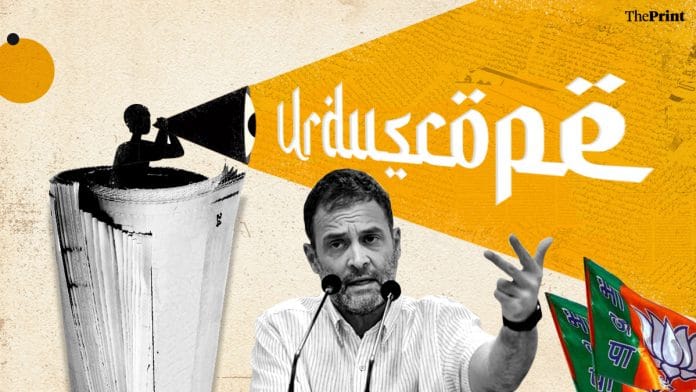New Delhi: If page-one space were a measure of the stature of a political leader, then Rahul Gandhi was the tallest political leader in the country this week as his statements and travails hogged front pages and editorials of prominent Urdu newspapers.
From the continued protests over his speeches and statements in the UK earlier this month to his eventual conviction by a Surat court, Gandhi remained the major newsmaker this week.
Former Pakistan prime minister Imran Khan and his possible arrest in connection with the Toshakhana case kept Gandhi company on page one.
Other news that made headlines this week included the ongoing hunt for radical Sikh preacher Amritpal Singh and Assam Chief Minister Himanta Biswa Sarma’s remarks on shutting down madrasas.
ThePrint brings you a roundup of all that made the headlines in the Urdu press this week.
Rahul Gandhi
For much of the week, the disruptions in Parliament over Gandhi’s comments in the UK made front-page headlines.
During his visit to the University of Cambridge, Gandhi had claimed that democracy in India was under attack by the ruling dispensation. The remarks resulted in pandemonium in Parliament, with leaders from the ruling BJP demanding that he apologise for having “denigrated” India on foreign soil.
However, this news was eventually replaced by Gandhi’s conviction in a criminal defamation case for a 2019 speech made in Kolar, Karnataka, where he had asked why “all these thieves” have Modi as their surname.
On 18 March, the front page of Roznama Rashtriya Sahara said that a stalemate persisted in Parliament over Gandhi’s speeches. Another report in the newspaper said opposition parties were holding a protest in front of the Gandhi statue in Parliament over American short-seller Hindenburg’s allegations against the Adani Group.
In an editorial the same day, Siasat said that BJP loses no opportunity to target Gandhi. Whenever he highlights the Modi government’s failures and tries to initiate public debate on them, the pace of such attacks goes up, the editorial alleged. The latest spate of attacks, it added, seemed to be part of a larger plan.
An editorial in Sahara the same day wondered what was wrong with Gandhi’s statements in the UK. The editorial, titled ‘Why not question democracy’, says that to say that the media and courts in India are being controlled would not be wrong because the communal venom spewing from the TV screens in the country was at a record high.
On 20 March, Inquilab reported that the Delhi Police had served Rahul Gandhi over his statement about women facing harassment in India. The notice, which called Gandhi for questioning, came on the back of the statements he made during his UK tour.
A separate article in the same paper reported that Gandhi had responded to the objections and allegations made by BJP leaders.
Yet another one said BJP president J.P. Nadda had accused Gandhi of crossing “all limits of democracy”. He was virtually addressing the ‘National Youth Parliament’, an event organised by the Bharatiya Janata Yuva Morcha in Chennai.
A day later, the newspaper carried a photo of Gandhi and Congress president Mallikarjun Kharge campaigning in Karnataka. Gandhi, the paper said, had been fiercely critical of corruption and attempts to spread communal hatred while addressing the rally in Belagavi city.
On 24 March, Siasat’s main story reported that Gandhi had been held guilty in connection with the “Modi surname” remark.
Sahara’s lead report, which also carried the news, reported that the conviction put Gandhi’s Lok Sabha membership at risk.
Hunt for Amritpal
The ongoing manhunt for radical Sikh preacher Amritpal Singh kept the front pages buzzing all week.
On 21 March, Siasat reported that a group of pro-Khalistan protesters had allegedly attacked the Indian consulate in San Francisco. The attack was condemned by Indian Americans, who demanded action, the report said.
Vandalism was also reported at the Indian High Commission in London, where hundreds of alleged Khalistan sympathisers barged into the building and grabbed the Tricolour.
India strongly objected to this and summoned the British High Commissioner in Delhi, the reports said, adding that one person had been arrested.
On 23 March, Sahara reported that the barricades that were up in front of the British High Commission after the previous day’s protest had been taken down.
The same day, Inquilab reported that the Indian government had reduced security outside the British High Commission in a retaliatory move.
Madrasas and child brides
Issues pertaining to Islamic education in madrasas and personal laws also made page-one headlines.
On 22 March, Siasat reported that the Supreme Court could consider the controversial question about the age of marriage for Muslim girls. The report said the question before the court came in the form of an appeal against the Allahabad High Court’s ruling holding the marriage of a 16-year-old Muslim girl illegal.
Assam CM Sarma’s statement on closing all madrasas in the state also drew a reaction from the Urdu press.
On 24 March, an editorial in Inquilab said that while Sarma, who crossed over to the BJP from the Congress, has been “amply and richly rewarded, he seems to expect more laurels to come his way.
Organisations such as the Vishva Hindu Parishad, Bajrang Dal, the Rashtriya Swayamsevak Sangh, and the BJP probably know better than the common Muslim what madrasas do, the editorial said. And yet they want to create an issue out of this, it said.
Imran Khan and Toshakhana case
The Toshakhana case in Pakistan also made front-page headlines.
On 18 March, Sahara said that an arrest warrant against former Pakistan prime minister Imran Khan had been suspended to enable him to appear before a court.
A day later, Siasat reported that the warrant had been cancelled and a court hearing on the issue was scheduled on 30 March.
(Edited by Uttara Ramaswamy)
Also Read: Communal tensions have already hurt India’s image: Urdu press on row over Rahul’s Cambridge speech






